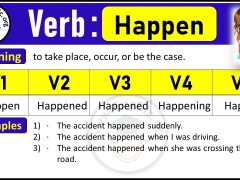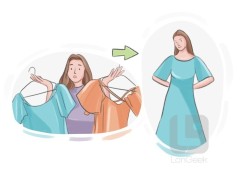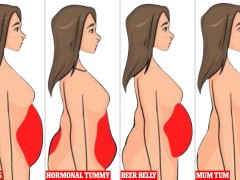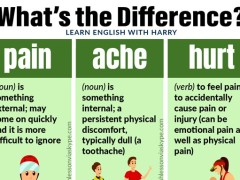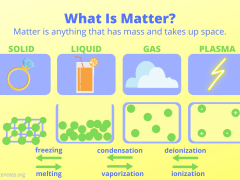verb [vt. 及物动词]发生;使遭遇;碰巧 - We cannot say for sure what will happen.
adverb [方式副词]<北英格兰>或许,大概 - He called Amy to see if she knew where his son was. As it happened, Amy did know.
"What happened?"(发生了什么?)是一个常用的英文短语(一般过去时),用于询问某个事件、情况或故事的经过或结果。它可以用于各种情境,包括但不限于以下几种:
1. 听到某个事件的一部分或片段后,想要了解完整的发生过程。
2. 见到某人情绪不对或表现异常时,想要了解他们遭遇了什么事情。
3. 对话中突然有暧昧的地方,想要得到更多的解释或细节。
4. 在某个剧情或故事的转折点上,想要知道接下来会发生什么。
"What's happening?"(正在发生什么?)是一个常用的英文短语,用于询问当前正在进行的事情或事件。它可以用于各种情境,包括但不限于以下几种:
1. 当你进入一个新的场景或环境,想要了解目前正在发生的活动或情况。
2. 当你注意到周围有一些活动或事件正在进行时,想要了解具体的细节。
3. 当你看到人们在忙碌或紧张地做某事时,想要了解他们所从事的具体活动。
4. 当你希望得到最新的消息或情况更新时,可以用这个短语来询问。
"happen to somebody"是一个常见的英文短语,表示某事发生在某人身上。它可以用于描述不同类型的事件或情况,如意外事故、好运、不幸或其他经历。下面是几个例子:
1. "What happened to John?"(约翰发生了什么事?)
2. "Good things always happen to her."(她总是有好运气。)
3. "I can't believe this happened to me."(我简直不能相信这发生在我身上。)
adjective [原级]生病的,患病的;病人的;恶心的,想吐的;不快的,恼怒的;厌倦的,厌烦的;(情感)强烈得令人不适的;(人)变态的,病态的;(故事、笑话等)令人毛骨悚然的,病态的;不祥的;(喻)(组织,体系,社团)面临严重问题的,不景气的;<非正式> 极好的;渴望的 - He's very sick. He needs medication.
noun [抽象名词]病人(the sick);<英,非正式> 呕吐物 - There were no doctors to treat the sick.
verb [vt. 及物动词]<英,非正式> 呕吐;放狗咬;<非正式> 派某人去追击(或监视、陪伴) - His hypocrisy makes me sick.
adjective [原级]神经紧张的,担忧的;神经质的,神经过敏的;神经的,神经系统的;(疾病)由精神紧张引起的,由精神压力造成的;易激动的,易兴奋的;强健有力的 - She flicked him a nervous glance.
名词 + ous = 形容词
① adj. 神经质的,神经紧张的
- She is a nervous woman. Do you see that nervous smile on her face?
② 紧张的,担心的,情绪不安的
- He had never spoken in public, so he was very nervous.
- nervous adj. 精神紧张的(事情发生时)
- worried adj. 担心的(为以后的事情)
- upset adj. 不安的 (对以前的事情)
- irritable adj. 易怒的,急躁的
- Our teacher is an irritable old lady.
- She gets angry easily.
verb [vi. 不及物动词]相信;认为,猜想;信教 - If you believe someone or if you believe what they say or write, you accept that they are telling the truth.
think vs believe
I think… 我认为
I believe... 我相信并认为
- I also think…
- I still think…
- Do you think so?
feel: 感觉、认为
hold: 握住、坚持认为
consider: 考虑、认为
preposition [状态和条件]没有,缺乏;不使用,不借助;在没有(发生或做某事)的情况下;没有,不带(某种感情);不和…在一起,无…相伴;在外面,在外部 - I don't like myself without a beard.
adverb [方式副词]没有,缺乏;在外面 - He complied without argument.
noun [抽象名词]外部,外面 - She is entirely without malice.
adverb [地点副词]顺楼梯而下,往楼下;在楼下 - Denise went downstairs and made some tea.
adjective [原级]在楼下的,在底楼的 - She repainted the downstairs rooms and closed off the second floor.
noun [专属名词]楼下(尤指地面的一层),下面的几层楼 - The downstairs of the two little houses had been entirely refashioned.
verb [vi. 不及物动词]影响(或决定)…的结果;断定,判定;使下决心;决定,选定;裁决,判决 - If a person or group of people decides something, they choose what something should be like or how a particular problem should be solved.
verb [vt. 及物动词]道歉,谢罪 - I apologize for being late, but I have just had a message from the hospital.
apologize to sb. for sth. 因为某事而道歉
- I apologized to him for being late.
make an apology to sb. for sth. 名词做中心词
say sorry to sb. for sth. 口语(更通俗)
noun [专属名词]礼物,赠品;恩赐,授予;轻而易举的事,绝对不会错失的机会;才能,天赋 - They believed the unborn child was a gift from God.
verb [vi. 不及物动词]赠送;(无意中)让(对手)获得 - The watch was a gift from my mother.
noun [专属名词]盆景;盆景艺术 - Their trunks are as gnarled as bonsai. Long faintly glowing tendrils hang straight down in pastel curtains.
noun [专属名词](Bonsai)(美)蓬赛(人名) - Their trunks are as gnarled as bonsai.
verb [vt. 及物动词]成为…的一员,参加;连接,接合;联合,汇合;上(火车、飞机等);和…作伴,随同 - If you join an organization, you become a member of it or start work as an employee of it.
noun [抽象名词]连接处,接合点 - To join two things means to attach or fasten them together.
noun [专属名词]肚子,胃 - Mummy, I've got a tummy ache.
verb [vt. 及物动词](隐隐地、持续地)疼痛;渴望;哀痛,怜悯 - The glands in her neck were swollen, her head was throbbing and she ached all over.
noun [抽象名词](身体某部位的)疼痛;(心中的)苦痛,痛苦;<文>渴望; <文>渴望 - You feel nausea and aches in your muscles.
noun [专属名词]【名】 (Ache)(美、法、印尼)阿切(人名) - The pain, usually a dull ache, gets worse with exercise.
adjective [原级]重要的,重大的;(人)影响很大的,权威的;大量的,许多的;自负的,自命不凡的 - The most important thing in my life was my career.
preposition [时间介词]自…以后,自…以来;(表示气愤)何曾,什么时候 - We've lived here since 1994.
conjunction [并列连词]在…以后,自…以来;因为,由于,既然 - She's been off work since Tuesday.
adverb [时间副词]自…以后,自…以来;此后,后来 - She's been off work since Tuesday.
since + 时间点
- She has been in Beijing since 2004.
since + n.
- She hasn't been out since the accident.
noun [抽象名词]事情,问题;事态,情况;困境,麻烦(the matter);物质;材料,物品,东西;书面材料,印刷品;(身体感染部位排出的)脓,黄水;命题内容;(表示数量或时间之少)大约,左右;(法庭审问或证明的)事项,案件 - It was clear that she wanted to discuss some private matter.
verb [vi. 不及物动词]要紧,有关系;(伤口)化脓,流脓 - A lot of the food goes on the floor but that doesn't matter.
noun [抽象名词]事实,真相;现实 - When you refer to something as a fact or as fact, you mean that you think it is true or correct.
noun [抽象名词]时髦打扮,流行装扮;时尚,时兴;(做事的)方式;时装领域,时尚界 - A fashion is a style of clothing or a way of behaving that is popular at a particular time.
verb [vt. 及物动词](尤指用手工)制作,使成形;塑造 - I never pay attention to fashion and brands.
out of fashion 过时的
- Short skirts are in fashion now.
- These shoes are out of fashion.
noun [专属名词]小姐(未婚女子)、女士,年轻未婚女子 - an unmarried woman or girl, esp a schoolgirl
verb [vt. 及物动词]想念,未击中,不懂;未做,错过 - If you miss a chance or opportunity, you fail to take advantage of it.
adverb [频率副词]偶然,偶尔 - I have a manicure occasionally.
- on the occasion 偶尔
- sometimes 偶尔
- at times 偶尔
- off and on 偶尔
- now and again 偶尔
noun [专属名词]午夜,半夜 - It was well after midnight by the time Anne returned to her apartment.
adjective [原级]半夜的,午夜的 - It is totally out of the question to postpone the midnight deadline.
adjective [原级]早期的,初期的;提早的,提前的;早开花的,早熟的 - I decided that I was going to take early retirement.
adverb [程度副词]在早期,在初期;提早,提前 - I knew I had to get up early.
verb [vt. 及物动词]承诺,保证;使很可能,预示;指望,期待(promoise oneself);<古>把(某人,尤指女人)许配给;有指望,有前途 - If you promise someone something, you tell them that you will definitely give it to them or make sure that they have it.
noun [抽象名词]承诺,诺言;前途,指望;迹象,预示 - A promise is a statement that you make to a person in which you say that you will definitely do something or give them something.
noun [专属名词]原因,理由;充分理由,正当理由;道理,情理;判断力,理智 - There is a reason for every important thing that happens.
verb [vi. 不及物动词]推理,逻辑思考;推论出,推断出(reason sth. out);对(某人)以理相劝,劝告(reason with) - I reasoned that changing my diet would lower my cholesterol level.
for some reason 因为某种原因 ✓
for some reasons 因为某些原因 ✓
- For no reason 没有原因/理由
- for this reason 由于这个理由、原因
- for these reasons 由于这些理由、原因
I was late. as + 句子
- 由 于 …… because + 句子 由于……
adjective [原级]安全的,平安的;不损害(或危害)健康的;谨慎的;(地点或局势)安全的;不会丢失,不会被拿走;<非正式> 不错的;不致引起争议的,有把握的;(棒球)成功上垒的;(选举中席位)十拿九稳的;无风险的,稳妥的 - If a person or thing is safe from something, they cannot be harmed or damaged by it.
noun [专属名词]保险箱;<美,非正式> 阴茎套,安全套;纱橱 - A safe is a strong metal cabinet with special locks, in which you keep money, jewellery, or other valuable things.
adverb [方式副词]<美,非正式> 安全地,平安地 - All 140 guests were brought out of the building safely by firemen. 140
noun [抽象名词]旅行,旅游;出门,出行;绊倒 - She videotaped the entire trip.
verb [vi. 不及物动词]绊,绊倒;脚步轻快地走(或跑、跳舞) - Someone will trip over that cable.
旅行活动: "trip"通常指的是离开家乡或常住地,暂时前往其他地方的旅行。它可以是短途旅行,也可以是长途旅行。
- We are planning a trip to Europe this summer.(我们计划今年夏天去欧洲旅行。)
- She took a weekend trip to the mountains.(她去山区度过了一个周末。)
出差: 在商务或工作的背景下,“trip”也可以表示出差。
- He went on a business trip to New York for a week.(他出差到纽约一周。)
- Our company often sends employees on trips to attend conferences.(我们公司经常派员工参加会议出差。)
短暂的访问或停留: "trip"还可以表示短暂的访问或停留。
- He made a quick trip to the grocery store.(他快速地去了趟杂货店。)
- I'll just make a short trip to the restroom and be right back.(我只是去一下洗手间,马上回来。)
失误或摔倒:在口语中,"trip"还可以指摔倒或绊倒。
- Be careful not to trip on the stairs.(小心别在楼梯上绊倒。)
- I tripped and dropped my phone.(我绊了一下,手机摔了。)
衍生词汇:
- Tripper:指旅行者或参观者。
- Day trip:指当天的短途旅行。
- Field trip:指学校或组织组织的实地考察活动。
总结来说,"trip"是指旅行或短期出行的名词,可以指短途或长途旅行、商务出差、短暂的访问或停留等。此外,在口语中,它还可以表示摔倒或失误。
1. Take a trip:去旅行
- We're planning to take a trip to the beach next month.(我们打算下个月去海滩旅行。)
2. Business trip:出差
- He went on a business trip to Shanghai for a week.(他去上海出差一周。)
3. Road trip:自驾旅行
- Let's go on a road trip and explore the countryside.(我们一起去自驾游,探索乡村。)
4. Trip planner:旅行规划者
- I hired a trip planner to help me organize my itinerary.(我雇了一个旅行规划者来帮我安排行程。)
5. Trip cancellation:旅行取消
- Unfortunately, due to unforeseen circumstances, we had to deal with a trip cancellation.(不幸的是,由于不可预见的情况,我们不得不面对旅行取消的问题。)
6. Day trip:一日游 (one-day trip,two-day trip)
- We took a day trip to the nearby city to visit the museum.(我们进行了一次一日游,去附近的城市参观博物馆。)
7. Field trip:实地考察
- The students went on a field trip to the zoo to learn about different animals.(学生们进行了一次实地考察,到动物园了解不同的动物。)
8. Trip advisor:旅行顾问
- I always check reviews on Trip Advisor before booking a hotel.(在预订酒店之前,我总是在Trip Advisor上查看评价。)
9. Trip of a lifetime:终生难忘的旅行
- Climbing Mount Everest was a trip of a lifetime for him.(登上珠穆朗玛峰是他一生中的难忘之旅。)
10. Field trip:野外考察
- The students went on a field trip to study the local ecosystem.(学生们进行了一次野外考察,研究当地生态系统。)
verb [vi. 不及物动词]站立,直立;起立,站起来;使直立,竖放;位于(某处或某位置);高度为,高达;处于(某种状态);停,停靠;停滞,不流动,放着不动;很可能会;持有(某种态度或看法);达特定水平(或数量、高度等);保持有效,维持不变;忍受,容忍;经得起,经受 - She was standing beside my bed staring down at me.
noun [专属名词]架,座,台;立场,见解;货摊,售货亭;反抗,抵抗;(体育场的)看台;摊位,展台;证人席;(在一局板球赛中两个击球员的)坚守时间,总计得分;出租车站,公共汽车站;林分 - He felt the need to make a stand against racism in South Africa.
